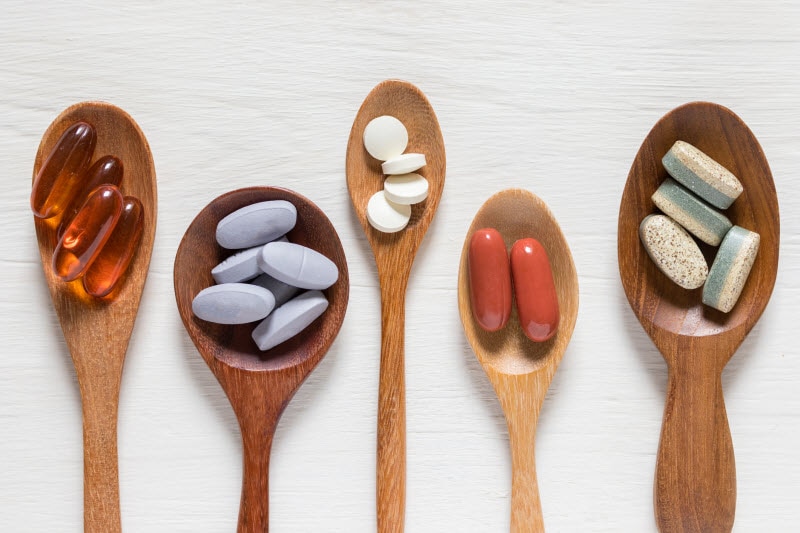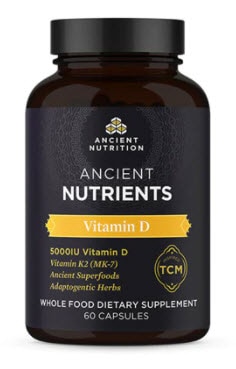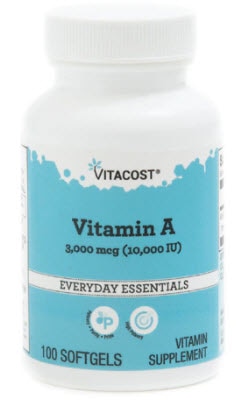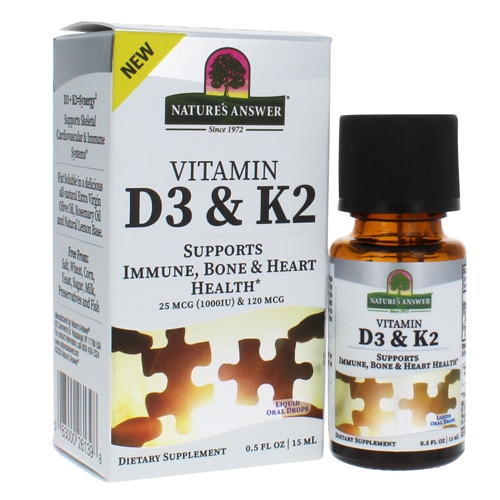Did you know that certain
essential vitamins — specifically vitamins A, D, E, and K — need to be consumed along with dietary fat in order to be absorbed properly? This explains why these vitamins are found in foods that also contain fats (or fatty acids), such as milk, beef, organ meats and nuts.

Solubility refers to “ability to be dissolved, especially in water.” What makes fat-soluble vitamins different than water-soluble vitamins, such as vitamin C and B vitamins, is they are similar to oil and do not dissolve in water inside the body.
They also tend to be stored for longer periods of time in the body, meaning it’s riskier to consume too much of them from supplements compared to water-soluble vitamins which are excreted in urine more easily.
As essential vitamins, you need them for functions such as heart health, immune support, bone metabolism, growth and development, and more.
What are fat soluble vitamins?
Fat-soluble vitamins are vitamins that are absorbed along with fats in your diet. They are then stored inside of your body in your liver and fatty tissues.
What foods contain fat-soluble vitamins? Although we refer to these vitamins by one name, such as vitamin A or
vitamin D, each one is actually a group of related compounds.
Some of these compounds are found in their “active” forms in animal foods, such as eggs, meat or milk, while others are often found in their “inactive” forms in plant foods, such as nuts and vegetables.
Top fat soluble vitamins
1. Vitamin A
Vitamin A refers to a group of compounds known as retinoids. The most common dietary form of vitamin A is retinol, which is an active form found in animal foods. Another common form is beta-carotene (also called provitamin A), which is found in plants and needs to be converted to the active form once consumed.
Functions and benefits of vitamin A include:
- Protecting vision. This vitamin helps protect light-sensing cells in the eyes and protects the eyes from damage and vision loss.
- Supporting the immune system and protecting against development of infections.
- Facilitating growth and development in infants, babies and children.
- Helping to protect skin from damage and promoting hair growth.
- Aiding in fertility reproductive health.
The recommended daily allowance (RDA) for vitamin A is between 2,300 and 3,000 IU (or 700 to 900 mcg) for adult men and women. Low doses are needed by babies and children, ranging from 1,000 IU to 2,000 IU (or 300 to 600 mcg).
How can you get enough? The best sources are liver,
fish liver oil, eggs, butter, carrots, and leafy greens like kale and spinach.
Most people get enough vitamin A from their diets and don’t need to supplement. If someone is going to take vitamin A supplements, the safe upper limit is 10,000 IU (900 mcg) per day, which shouldn’t be exceeded due to risk of toxicity and side effects. Pregnant women should be careful about taking vitamin A supplements or eating high amounts of vitamin A because of the risk of birth defects.
2. Vitamin D
Like vitamin A, vitamin D describes a few related fat-soluble vitamins, These include vitamin D2 (also called ergocalciferol) and
vitamin D3 (also called cholecalciferol). The liver and kidneys change calciferol into calcitriol, which is the biologically active form of vitamin D
Functions and benefits of vitamin D include:
- Aiding in bone health and maintenance. It regulates how calcium and phosphorus are used by the body to build and strengthen bones.
- Supporting the immune system regulation and helping to defend against inflammation and infections..
- Aiding in body weight management.
- Supporting a healthy mood
Unlike other fat-soluble vitamins, vitamin D is not found in high amounts in foods. It’s nicknamed the “sunshine vitamin” because the human body makes its own vitamin D when bare skin is exposed to sunlight (without sunscreen).
In small amounts, vitamin D can be found in some mushrooms, eggs, fish, fish oil, meat and most dairy products that have been fortified with added vitamin D.
But the best way to prevent
vitamin D deficiency is to regularly expose large parts of your skin to sunlight for about 15 minutes per day.
Many adults are thought to be deficient in vitamin D because they spend more of their time indoors, especially during colder months of the year. Deficiency is thought to contribute to poor immune function, an increased susceptibility to infections, bone-related issues, potentially mood problems and weight gain and possibly some autoimmune diseases.
Vitamin D supplements are recommended for most children and adults to prevent deficiency. The RDA for vitamin D is 600 IU to 800 IU for adults (15 to 20 mcg). Babies younger than 1 year old need 400 IU of vitamin D a day, which is added to most baby formulas.
The safe upper limit for adults is 4,000 IU per day, which shouldn’t be exceeded to avoid side effects. If taking supplements, opt for vitamin D3, which is more efficiently converted into calcitriol than vitamin D2.
3. Vitamin E
Vitamin E is a vitamin with unique antioxidant properties, meaning it helps to fight free radical damage, oxidative stress and inflammation.
This allows
vitamin E to help protect against age-related symptoms and certain diseases, including those affecting the heart and skin.
“Vitamin E” refers to 8 compounds that are divided into two groups: Tocopherols (including alpha-tocopherol and beta-tocopherol) and tocotrienols (including alpha-tocotrienol and beta-tocotrienol). Alpha-tocopherol is the most common form of vitamin E in our diets.
Functions and benefits of vitamin E include:
- Protecting cells against damage.
- Supporting the immune system in fighting off illnesses.
- Helping to increase blood flow by promoting the dilation of blood vessels. This can help support normal blood pressure and potentially reduce the risk of heart disease.
- Having certain blood-thinning effects and potentially helping to support normal cholesterol levels, including by reducing levels of “bad” LDL cholesterol.
The best food sources of vitamin E are certain vegetable oils (including sunflower, safflower, corn, and soybean oils, although these refined oils have drawbacks), wheat germ, almonds, peanuts, hazelnuts, sunflower seeds, green leafy vegetables, and fortified breakfast cereals.
The RDA for vitamin E is 23 IU (15 mg) for adults, and between 9 IU and 23 IU (6 to 9 mg) for children.
Vitamin E deficiency is very uncommon but can affect people with malabsorption issues due to having certain diseases like cystic fibrosis and liver disease. Supplementation isn’t recommended for most people considering most meet their needs by eating a varied diet.
However, if someone is at risk for heart disease, their doctor may recommend a supplement to help manage blood pressure and cholesterol.
4. Vitamin K
Vitamin K is actually a group of fat-soluble compounds divided into two main groups:
Vitamin K1 (phylloquinone), which is found in plant-sourced foods, and vitamin K2 (menaquinone), which is found in animal-sourced foods and fermented soy products.
Functions and
benefits of vitamin K include:
- Facilitating normal blood clotting. It helps to prevent excess bleeding and promotes health of arteries/blood vessels.
- Supporting bone health by playing a role in formation and maintenance of bones.
- Helping to prevent calcification of blood vessels, potentially reducing the risk of heart disease.
The top food sources of the two different types of vitamin K include: leafy greens like spinach and kale, brussel sprouts, egg yolks, butter, natto (fermented soy), liver and some grains.
The RDA for vitamin K is between 90 mcg and 120 mcg for adult men and women. Children need between 30–75 mcg per day.
Vitamin K deficiency is rare but can affect people suffering from diseases like celiac disease, inflammatory bowel disease and cystic fibrosis. Getting too little from your diet can increase the risk for problems like blood clotting issues and low bone density. If your doctor recommends supplementing, take no more than 1 mg a day to prevent adverse effects.
†These statements have not been approved by the Food and Drug Administration. These products are not intended to diagnose, treat, cure or prevent disease.
Featured Products


 Solubility refers to “ability to be dissolved, especially in water.” What makes fat-soluble vitamins different than water-soluble vitamins, such as vitamin C and B vitamins, is they are similar to oil and do not dissolve in water inside the body.
They also tend to be stored for longer periods of time in the body, meaning it’s riskier to consume too much of them from supplements compared to water-soluble vitamins which are excreted in urine more easily.
As essential vitamins, you need them for functions such as heart health, immune support, bone metabolism, growth and development, and more.
Solubility refers to “ability to be dissolved, especially in water.” What makes fat-soluble vitamins different than water-soluble vitamins, such as vitamin C and B vitamins, is they are similar to oil and do not dissolve in water inside the body.
They also tend to be stored for longer periods of time in the body, meaning it’s riskier to consume too much of them from supplements compared to water-soluble vitamins which are excreted in urine more easily.
As essential vitamins, you need them for functions such as heart health, immune support, bone metabolism, growth and development, and more.





